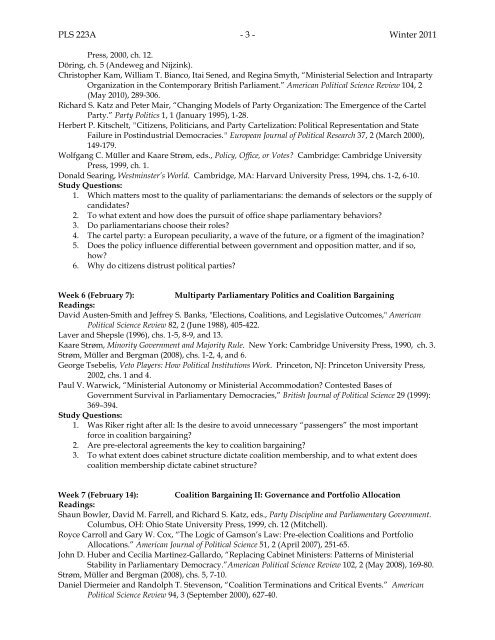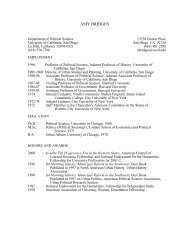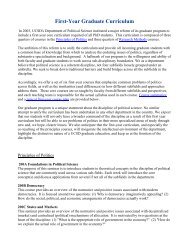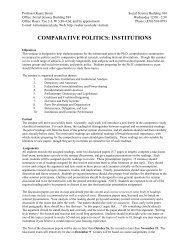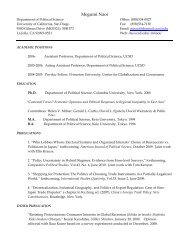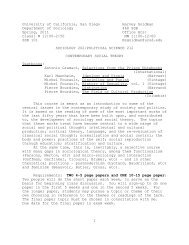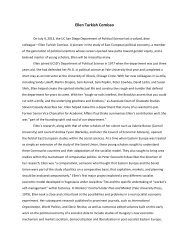Comparative Parliamentary Studies - Department of Political Science
Comparative Parliamentary Studies - Department of Political Science
Comparative Parliamentary Studies - Department of Political Science
You also want an ePaper? Increase the reach of your titles
YUMPU automatically turns print PDFs into web optimized ePapers that Google loves.
PLS 223A - 3 - Winter 2011Press, 2000, ch. 12.Döring, ch. 5 (Andeweg and Nijzink).Christopher Kam, William T. Bianco, Itai Sened, and Regina Smyth, “Ministerial Selection and IntrapartyOrganization in the Contemporary British Parliament.” American <strong>Political</strong> <strong>Science</strong> Review 104, 2(May 2010), 289-306.Richard S. Katz and Peter Mair, “Changing Models <strong>of</strong> Party Organization: The Emergence <strong>of</strong> the CartelParty.” Party Politics 1, 1 (January 1995), 1-28.Herbert P. Kitschelt, "Citizens, Politicians, and Party Cartelization: <strong>Political</strong> Representation and StateFailure in Postindustrial Democracies." European Journal <strong>of</strong> <strong>Political</strong> Research 37, 2 (March 2000),149-179.Wolfgang C. Müller and Kaare Strøm, eds., Policy, Office, or Votes? Cambridge: Cambridge UniversityPress, 1999, ch. 1.Donald Searing, Westminster’s World. Cambridge, MA: Harvard University Press, 1994, chs. 1-2, 6-10.Study Questions:1. Which matters most to the quality <strong>of</strong> parliamentarians: the demands <strong>of</strong> selectors or the supply <strong>of</strong>candidates?2. To what extent and how does the pursuit <strong>of</strong> <strong>of</strong>fice shape parliamentary behaviors?3. Do parliamentarians choose their roles?4. The cartel party: a European peculiarity, a wave <strong>of</strong> the future, or a figment <strong>of</strong> the imagination?5. Does the policy influence differential between government and opposition matter, and if so,how?6. Why do citizens distrust political parties?Week 6 (February 7):Multiparty <strong>Parliamentary</strong> Politics and Coalition BargainingReadings:David Austen-Smith and Jeffrey S. Banks, "Elections, Coalitions, and Legislative Outcomes," American<strong>Political</strong> <strong>Science</strong> Review 82, 2 (June 1988), 405-422.Laver and Shepsle (1996), chs. 1-5, 8-9, and 13.Kaare Strøm, Minority Government and Majority Rule. New York: Cambridge University Press, 1990, ch. 3.Strøm, Müller and Bergman (2008), chs. 1-2, 4, and 6.George Tsebelis, Veto Players: How <strong>Political</strong> Institutions Work. Princeton, NJ: Princeton University Press,2002, chs. 1 and 4.Paul V. Warwick, “Ministerial Autonomy or Ministerial Accommodation? Contested Bases <strong>of</strong>Government Survival in <strong>Parliamentary</strong> Democracies,” British Journal <strong>of</strong> <strong>Political</strong> <strong>Science</strong> 29 (1999):369–394.Study Questions:1. Was Riker right after all: Is the desire to avoid unnecessary “passengers” the most importantforce in coalition bargaining?2. Are pre-electoral agreements the key to coalition bargaining?3. To what extent does cabinet structure dictate coalition membership, and to what extent doescoalition membership dictate cabinet structure?Week 7 (February 14): Coalition Bargaining II: Governance and Portfolio AllocationReadings:Shaun Bowler, David M. Farrell, and Richard S. Katz, eds., Party Discipline and <strong>Parliamentary</strong> Government.Columbus, OH: Ohio State University Press, 1999, ch. 12 (Mitchell).Royce Carroll and Gary W. Cox, “The Logic <strong>of</strong> Gamson’s Law: Pre-election Coalitions and PortfolioAllocations.” American Journal <strong>of</strong> <strong>Political</strong> <strong>Science</strong> 51, 2 (April 2007), 251-65.John D. Huber and Cecilia Martinez-Gallardo, “Replacing Cabinet Ministers: Patterns <strong>of</strong> MinisterialStability in <strong>Parliamentary</strong> Democracy.”American <strong>Political</strong> <strong>Science</strong> Review 102, 2 (May 2008), 169-80.Strøm, Müller and Bergman (2008), chs. 5, 7-10.Daniel Diermeier and Randolph T. Stevenson, “Coalition Terminations and Critical Events.” American<strong>Political</strong> <strong>Science</strong> Review 94, 3 (September 2000), 627-40.


